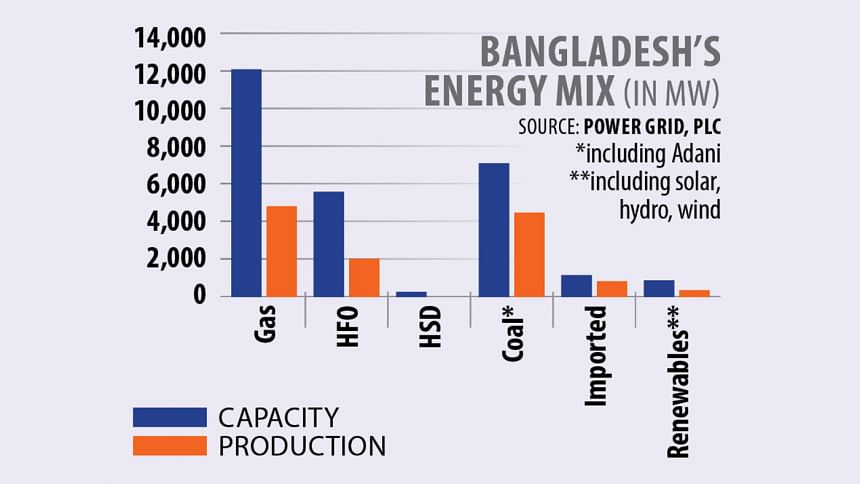Power supply may not improve anytime soon

The power supply situation has further deteriorated across the country as another power plant has completely shut and there is no sign of increasing generation in the immediate future.
Load-shedding or gap in power demand and supply hit the highest 2,312MW early yesterday, a record in recent weeks, according to the data of Power Grid Bangladesh PLC.
Rajshahi, Rangpur, Cumilla, Mymensingh and Sylhet areas are mostly affected by power cuts, the data shows.
From Monday evening, Dinajpur's 525-megawatt Barapukuria thermal power plant, the country's first coal-fired power producer, suspended operations after its lone functioning unit shut down for technical glitches, leaving the greater Rangpur area without electricity for a large part of the day.
The unit was supplying around 200MW of electricity.
Md Abu Bakkar Siddique, the chief engineer of the power plant, attributed the shutdown to the failure to conduct timely repairs by the Chinese contractor Harbin International.
Harbin did not adhere to contractual obligations regarding maintenance, he said, adding that the Chinese contractor had requested two weeks to resolve the technical fault.
Until then, small-scale businesses and battery-run autorickshaws will have to suffer.
Abdul Hannan, a rice miller in Bochaganj upazila of Dinajpur, said his mill's output has dropped significantly because of the unusual power cuts.
Sultan Mahmud, who runs a PVC printing business in Nawabganj upazila, said his business was affected by the frequent power cuts for the last couple of days.
"We are getting at least six hours' of power cuts every 24 hours," he said.
Load-shedding has hit Dhaka as well, according to data from the two distribution companies -- Dhaka Power Distribution Company and Dhaka Electric Supply Company. The two companies faced around 500MW of supply shortfall yesterday.
At least 25 gas-fired power plants have been shut since May 27 when cyclone Remal hit the coastal areas.
The cyclone damaged one of the country's two floating storage and regasification units (FSRUs), which brought down the LNG regasification capacity to 600 million cubic feet per day (mmcfd) from 1,100 mmcfd.
The FSRU tried to resume operations several times but failed.
It is now slated to resume operations on September 15, as per the interim government's recent announcement.
However, a PDB official said even if the FSRU comes into operation then, the situation will not improve immediately as the liquefied natural gas cargo will not arrive.
The government initiated the purchase process only recently and it will take at least two weeks for the cargo to arrive, he said.
Besides the gas shortfall, PDB officials are pinning the blame for frequent power cuts on insufficient electricity generation by the coal-based power plants due to various technical issues.
In the meantime, the Adani Godda power plant, which has outstanding bills of about $800 million, is supplying about 500MW less following instructions from PDB.
PDB has outstanding bills of about Tk 35,000 crore, most of which need to be paid in dollars, The Daily Star has learnt from officials involved with the proceedings.
Due to the dollar crunch, those payments have been put on hold, they said.
As of September 4, gross foreign exchange reserves stood at about $20.6 billion, enough to service about four months' import bill, according to data from the Bangladesh Bank.
The dollar crunch has interrupted the import of primary fuel including coal, gas and furnace oil, which hit the power sector, according to the officials concerned.
Subsequently, PDB has been unable to ramp up production despite higher demand due to the rising mercury.
The country's total power generation capacity is 27,086MW.

 For all latest news, follow The Daily Star's Google News channel.
For all latest news, follow The Daily Star's Google News channel. 






Comments